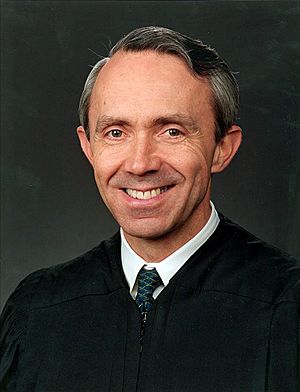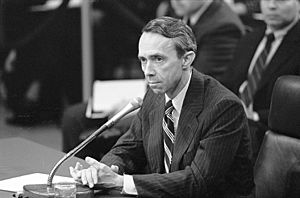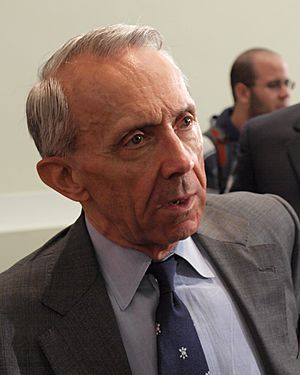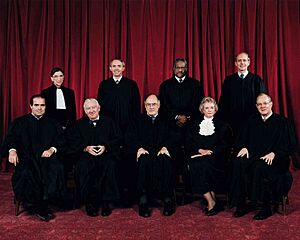David Souter facts for kids
Quick facts for kids
David Souter
|
|
|---|---|

Official portrait, 1990
|
|
| Associate Justice of the Supreme Court of the United States | |
| In office October 9, 1990 – June 29, 2009 |
|
| Nominated by | George H. W. Bush |
| Preceded by | William J. Brennan Jr. |
| Succeeded by | Sonia Sotomayor |
| Judge of the United States Court of Appeals for the First Circuit | |
| In office May 25, 1990 – October 9, 1990 |
|
| Nominated by | George H. W. Bush |
| Preceded by | Hugh H. Bownes |
| Succeeded by | Norman H. Stahl |
| Associate Justice of the New Hampshire Supreme Court | |
| In office 1983–1990 |
|
| Nominated by | John Sununu |
| Preceded by | Maurice Bois |
| Succeeded by | Sherman Horton |
| 20th Attorney General of New Hampshire | |
| In office July 17, 1976 – September 19, 1978 |
|
| Governor | Meldrim Thomson Jr. |
| Preceded by | Warren Rudman |
| Succeeded by | Thomas D. Rath |
| Personal details | |
| Born |
David Hackett Souter
September 17, 1939 Melrose, Massachusetts, U.S. |
| Died | May 8, 2025 (aged 85) Hopkinton, New Hampshire, U.S. |
| Political party | Republican |
| Education | |
| Signature |  |
David Hackett Souter (born September 17, 1939 – died May 8, 2025) was an American lawyer and judge. He served as an Associate Justice of the Supreme Court of the United States from 1990 until he retired in 2009. President George H. W. Bush chose him for this important role. Souter was part of both the Rehnquist and Roberts Supreme Courts.
Souter grew up in New England. He studied at Harvard College, Magdalen College, Oxford, and Harvard Law School. After working briefly as a private lawyer, he began working for the government. He was a prosecutor and later the Attorney General of New Hampshire. He also served as a judge in New Hampshire courts. In 1990, he became a judge for the United States Court of Appeals for the First Circuit.
In 2009, after Barack Obama became president, Souter announced he would retire from the Supreme Court. Sonia Sotomayor took his place. Even after retiring, Souter continued to hear cases in lower courts.
Contents
Early Life and Education
David Souter was born in Melrose, Massachusetts, on September 17, 1939. He was the only child of Joseph and Helen Souter. His family moved to a farm in Weare, New Hampshire, when he was 11.
Souter finished high school at Concord High School in 1957. He then went to Harvard University, graduating in 1961. He studied philosophy and wrote about legal ideas. He was also chosen as a Rhodes Scholar. This allowed him to study at Magdalen College, Oxford, in England. He earned a law degree from Harvard Law School in 1966.
Early Career in Law
In 1968, Souter started working for the government in New Hampshire. He became an assistant attorney general. The attorney general is the state's chief lawyer. In 1971, he became the deputy attorney general. He then became the Attorney General of New Hampshire in 1976.
In 1978, Souter became a judge on the New Hampshire Superior Court. This is a trial court. After four years there, he was appointed to the New Hampshire Supreme Court in 1983. This is the highest court in the state.
In 1990, President George H. W. Bush nominated Souter to be a judge on the United States Court of Appeals for the First Circuit. This is a federal court that hears appeals from lower courts. The Senate approved his nomination quickly.
Becoming a Supreme Court Justice
President George H. W. Bush was looking for a new Supreme Court Justice. His advisors suggested David Souter. Bush was very impressed by Souter's intelligence. At the time, not many people outside New Hampshire knew Souter.
Souter was sometimes called a "stealth justice." This meant his past work didn't show strong opinions on big national issues. President Bush liked this because he wanted to avoid a difficult approval process. Another nominee, Robert Bork, had been rejected by the Senate partly because of his many written opinions. Bush nominated Souter on July 25, 1990.
The Senate hearings to approve Souter began in September 1990. Some groups, like the National Organization for Women, opposed him. They worried about his views on women's rights. The NAACP also asked its members to oppose him.
During his opening statement, Souter spoke about the importance of judges. He said:
The first lesson, simple as it is, is that whatever court we are in, whatever we are doing, whether we are in a trial court or an appellate court, at the end of our task some human being is going to be affected. Some human life is going to be changed in some way by what we do... And so we had better use every power of our minds and our hearts and our beings to get those rulings right.
Souter's answers during the hearings surprised some people. He spoke about courts needing to help create a "just society." He also said courts should address important social issues if other parts of the government don't.
Despite some opposition, Souter was easily approved by the Senate. The Senate Judiciary Committee voted 13–1 to recommend him. The full Senate confirmed him on October 2, 1990, with a vote of 90–9. He was sworn into office a week later.
Serving on the U.S. Supreme Court
Souter served on the Supreme Court for nearly 19 years. He believed that cameras should not be allowed in the Supreme Court. He thought media might take things out of context and make the process too political.
He also represented the Court to Congress. He would explain the Court's needs for money to fix its building and for other projects.
How He Judged Cases
When Souter was first appointed, some thought he would be a very conservative judge. They believed he would interpret the Constitution strictly. However, Souter described himself as an "incrementalist." This means he preferred small changes and respected past decisions (called "precedent").
Over time, Souter's views seemed to shift. He often voted with the more liberal judges on the Court. For example, in the 1992 case Lee v. Weisman, he voted against allowing prayer at a high school graduation.
Because of his later votes, many conservatives felt Souter's appointment was a mistake. However, President Bush later said he was proud of Souter's "outstanding" service and "brilliance."
Important Decisions
Bush v. Gore
In 2000, Souter was one of four justices who voted in Bush v. Gore to allow a recount of votes in the presidential election. However, the majority of the Court voted to stop the recount. This decision led to George W. Bush being declared the winner in Florida.
Some reports said Souter was very upset by this decision. He reportedly considered leaving the Court because he felt the decision was too political. However, his close friend Warren Rudman said Souter was bothered but did not break down in tears.
Working with Other Justices
Souter got along well with most of the other justices. He had a good relationship with Sandra Day O'Connor. He was also very fond of Ruth Bader Ginsburg and thought John Paul Stevens was the "smartest" justice.
Retirement from the Court
Souter had wanted to leave Washington, D.C., and return to New Hampshire for a long time. In April 2009, he told the White House he planned to retire. He sent his official retirement letter to President Obama on May 1, 2009. Obama then announced Souter's retirement. On May 26, 2009, Obama nominated Sonia Sotomayor to take Souter's place. She was approved by the Senate in August.
On June 29, 2009, his last day on the Court, Chief Justice Roberts read a letter thanking Souter for his service. All eight of his fellow justices and retired Justice Sandra Day O'Connor signed it. Souter also read a letter back to them.
Souter's official papers have been given to the New Hampshire Historical Society. They will not be made public until at least 50 years after his death.
Life After the Supreme Court
Even after retiring from the Supreme Court, Souter remained a judge. He could still hear cases in lower courts. From his retirement until 2020, he regularly served on panels for the United States Court of Appeals for the First Circuit. This court covers states like Maine, Massachusetts, and New Hampshire.
Souter generally kept a quiet life after retiring. In 2012, he spoke about the dangers of "civic ignorance." These comments were later seen as very insightful about future political events.
Personal Life
David Souter never married, though he was once engaged. He was a member of the Episcopal Church.
In 2004, Souter was attacked while jogging in Washington, D.C. He had minor injuries. This event led to questions about the security for Supreme Court justices.
Souter was known for his simple lifestyle. He wrote with a fountain pen and did not use email or a cellphone. While on the Supreme Court, he liked to drive to New Hampshire for the summer. He enjoyed mountain climbing and doing his own home repairs. He was also known for eating an apple and plain yogurt for lunch every day.
A former Supreme Court reporter, Linda Greenhouse, wrote that Souter was very good at his job. She said his polite but sharp questions showed how well he prepared for cases. She noted that he chose to keep parts of his life simple, enjoying hiking, sailing, old friends, and reading history.
In August 2009, Souter moved from his family farmhouse in Weare to a smaller house in nearby Hopkinton, New Hampshire. He explained that his old farmhouse wasn't strong enough for his thousands of books.
Souter also served on hospital boards and community groups.
Death
David Souter passed away at his home on May 8, 2025, at the age of 85. Chief Justice John Roberts said that Souter served the Court with "great distinction" and brought "uncommon wisdom and kindness" to his public service. Roberts also noted that Souter continued to serve in lower courts after retiring.
See also
 In Spanish: David Souter para niños
In Spanish: David Souter para niños
- George H. W. Bush Supreme Court candidates
- Ideological leanings of United States Supreme Court justices
- List of justices of the Supreme Court of the United States
- List of law clerks of the Supreme Court of the United States (Seat 3)
- List of justices of the Supreme Court of the United States by court composition
- List of justices of the Supreme Court of the United States by seat
- List of United States Supreme Court justices by time in office
- United States Supreme Court cases during the Rehnquist Court
- United States Supreme Court cases during the Roberts Court
- Lost Liberty Hotel
- List of United States federal judges by longevity of service
 | Stephanie Wilson |
 | Charles Bolden |
 | Ronald McNair |
 | Frederick D. Gregory |




